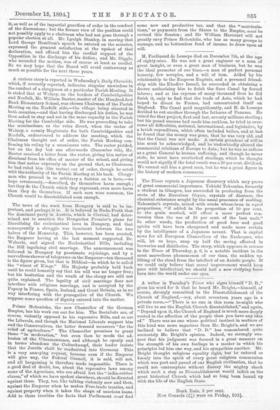Prince Holienlohe, the new Chancellor of the German Empire, has
his work cut out for him. The Socialists are, of course, violently opposed to his repressive Bills, and so are the Liberals, and though the National Liberals support him and the Conservatives, the latter demand measures "for the relief of agriculture." The Chancellor promises to grant these "in moderation," but even then he needs the ad- hesion of the Ultramontanes, and although he openly and In terms abandons the Culturkampf, their leader insists that the Jesuits shall be readmitted into Germany. This is a very annoying request, because even if the Emperor will give way, the Federal Council, it is said, will not, and all bargaining is therefore made impossible. There is a good deal of doubt, too, about the repressive laws among some of the Agrarians, who are afraid lest the " inclia-rubber clause," of which we have spoken elsewhere, should be directed against them. They, too, like talking violently now and then, against the Emperor when he makes Free-trade treaties, and against property when it takes the shape of usurious loans. Add to these troubles the facts that Parliament must find some new and productive tax, and that the " matricula- tions," or payments from the States to the Empire, must be revised this Session ; and Sir William Harcourt will not greatly envy Prince Hohenlobe, who has as many groups to manage, and no bottomless fund of income to draw upon at will.








































 Previous page
Previous page